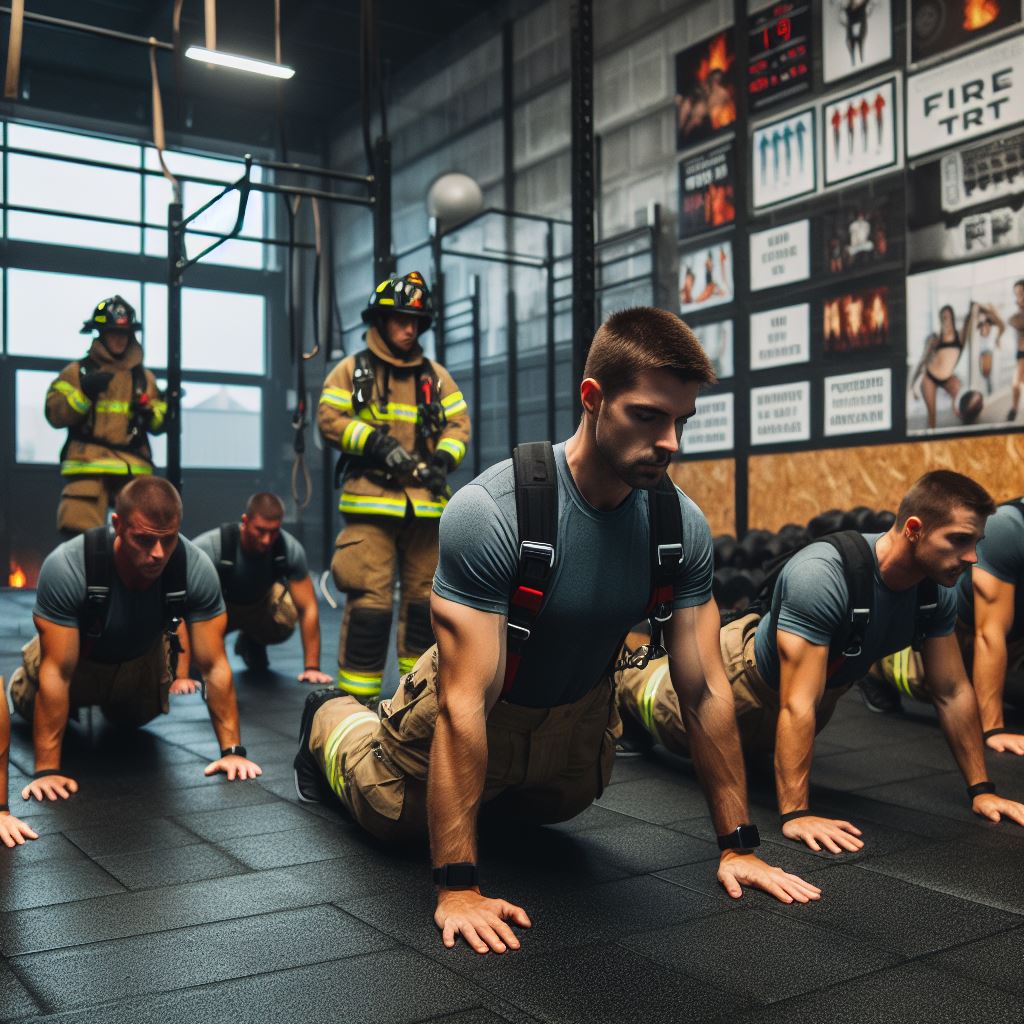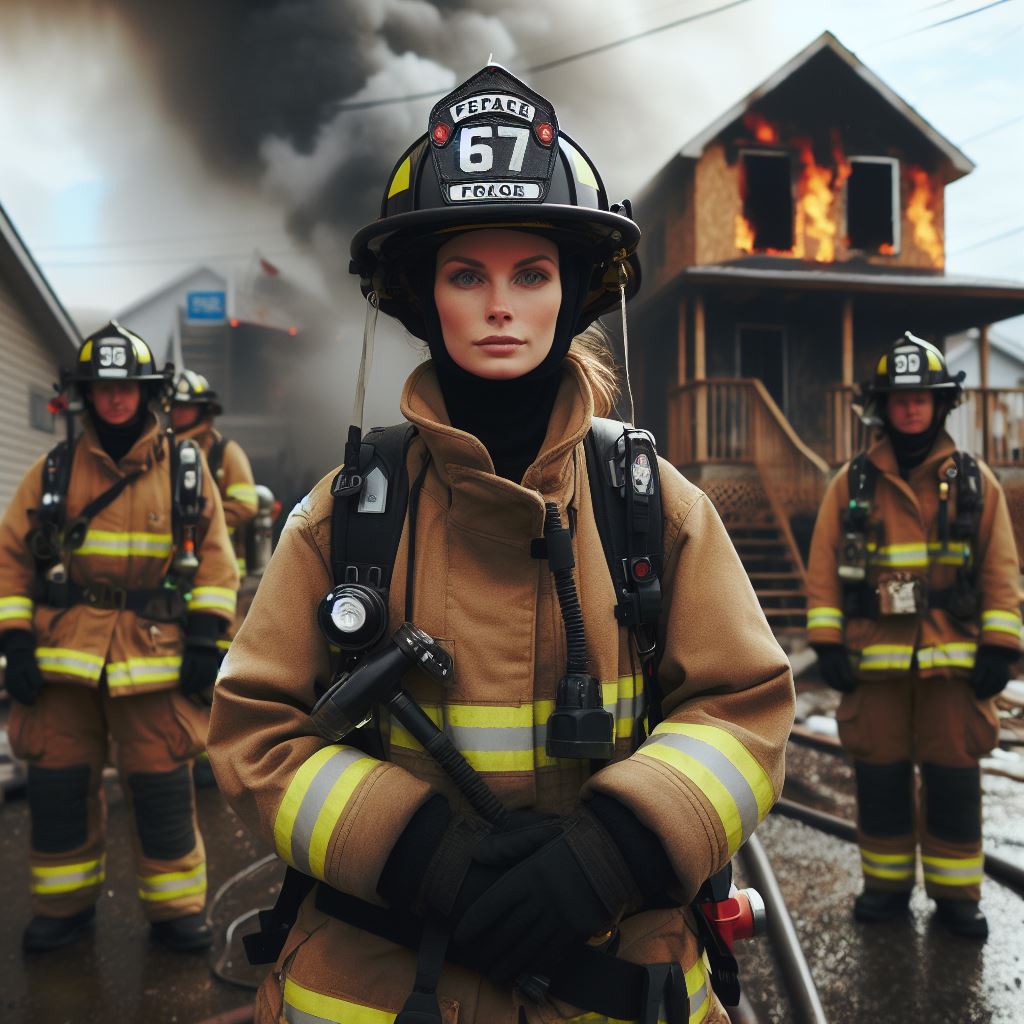Introduction
In Canada, firefighting education shapes heroes. These schools sculpt brave individuals, ready to face the flames.
Vancouver’s Justice Institute ignites passion. Humber College in Toronto sparks excellence with hands-on training.
Alberta’s Lakeland College fuels firefighting prowess. Dalhousie University in Nova Scotia blazes a trail in fire science.
Saskatchewan Polytechnic in Regina hones skills with cutting-edge technology. Northern Alberta Institute of Technology (NAIT) fans the flames of expertise.
From British Columbia to Newfoundland, these schools forge a united front against fire. Join us as we unravel the firefighting education landscape in the Great White North.
Get ready to embark on a journey where heroes are made and communities are safeguarded.
Importance of Choosing the Right Firefighting School
The significance of selecting a reputable and high-quality firefighting school
- Specialized Education: Reputable firefighting schools provide specialized education tailored for future firefighters.
- Comprehensive Training: High-quality schools offer comprehensive training programs to equip students with essential skills.
- Advanced Techniques: Selecting a reputable school ensures exposure to advanced firefighting techniques and technologies.
- Enhanced Safety: Proper training from a reputable school enhances firefighters’ safety during emergency situations.
- Professional Development: Attending a respected school opens doors for professional development and career advancement opportunities.
- Recognized Credentials: Graduating from a reputable school ensures recognition and credibility in the firefighting industry.
The impact of proper training on a firefighter’s career
- Competence and Confidence: Proper training instills competence and confidence in firefighters to handle challenging situations.
- Quick Decision-Making: Well-trained firefighters can make quick and effective decisions, minimizing risks and improving outcomes.
- Team Collaboration: Properly trained firefighters understand the importance of teamwork, enhancing overall performance during emergencies.
- Adaptability and Resilience: Quality training equips firefighters with the ability to adapt and stay resilient in unpredictable circumstances.
- Effectiveness in Saving Lives: Properly trained firefighters can efficiently save lives and protect property during fire incidents.
- Professional Reputation: Proper training contributes to building a firefighter’s professional reputation in the industry.
The benefits of attending accredited firefighting schools
- Quality Assurance: Accredited firefighting schools meet specific standards and guarantee the quality of education and training.
- Industry Recognition: Attending an accredited school ensures recognition and acceptance by employers in the firefighting sector.
- Networking Opportunities: Accredited schools provide networking opportunities for students to connect with industry professionals.
- Access to Resources: Students of accredited schools have access to resources and facilities necessary for effective training.
- Compliance with Regulations: Accredited schools adhere to firefighting regulations, ensuring students receive up-to-date and relevant education.
- Enhanced Job Prospects: Graduates from accredited schools have a higher likelihood of securing employment in reputable firefighting departments.
In general, selecting the right firefighting school is of utmost importance for aspiring firefighters.
Reputable schools offer specialized education, comprehensive training, and exposure to advanced techniques, ensuring the safety and competence of firefighters.
Proper training has a significant impact on a firefighter’s career, enhancing their abilities, decision-making skills, and overall effectiveness.
Attending accredited firefighting schools provides additional benefits such as industry recognition, networking opportunities, and access to necessary resources.
Therefore, choosing a reputable and high-quality firefighting school is a crucial step towards a successful and fulfilling career in firefighting.
Criteria for Evaluating Firefighting Schools
List of criteria to assess the top firefighting schools across Canada
- Program offerings: Look for a school that offers a comprehensive firefighting curriculum, including theoretical knowledge and practical training.
- Certifications: Check if the school provides certification programs that meet national standards and industry requirements.
- Faculty qualifications: Evaluate the credentials and experience of the instructors to ensure they are qualified to teach firefighting techniques.
- Facilities: Consider the school’s facilities, such as training grounds, fire simulators, and equipment, as these contribute to the hands-on learning experience.
Factors to consider in evaluating firefighting schools
- Program offerings: The school should offer specialized courses, such as hazardous materials response, technical rescue, and incident management.
- Certifications: Look for schools that provide certifications recognized by firefighting organizations and agencies.
- Faculty qualifications: Ensure that the instructors have relevant firefighting experience and certifications to effectively teach the necessary skills.
- Facilities: The presence of well-maintained fire training grounds, simulation rooms, and up-to-date equipment enhances practical training.
Importance of considering location and cost alongside other criteria
- Location: Evaluate the school’s proximity to potential job markets, as it can impact employment opportunities after graduation.
- Cost: Consider tuition fees, additional expenses, and financial aid options to determine the overall affordability of attending a particular school.
- Accessibility: Assess the school’s accessibility in terms of transportation and accommodation options for out-of-town students.
- Industry connections: Research the school’s partnerships with local fire departments and agencies, as they can provide valuable networking and employment prospects.
- Alumni success: Look into the career outcomes of past graduates to gauge the school’s track record in preparing students for the firefighting industry.
In short, evaluating top firefighting schools across Canada requires considering various criteria.
Program offerings, certifications, faculty qualifications, and facilities are important factors to assess.
Additionally, location, cost, industry connections, and alumni success should not be overlooked.
By thoroughly evaluating these aspects, prospective firefighting students can make informed decisions about their education and future careers.
Top Firefighting Schools in Eastern Canada
The top firefighting schools located in the eastern provinces of Canada
Nova Scotia Community College (NSCC)
- NSCC offers a two-year firefighting program that combines theory and practical training.
- Notable features include state-of-the-art facilities, including a firefighter training center and simulation labs.
- NSCC has produced successful alumni who are now serving as professional firefighters across Canada and abroad.
College of the North Atlantic (CNA) – Newfoundland and Labrador
- CNA provides a comprehensive firefighting program that covers various aspects of firefighting techniques and safety procedures.
- The program includes hands-on training and simulations, ensuring students gain practical skills.
- Many CNA alumni have gone on to work for renowned fire departments and have excelled in their careers.
Justice Institute of British Columbia (JIBC) – New Brunswick Campus
- JIBC offers a Firefighting Technologies Certificate program in partnership with the New Brunswick Community College (NBCC).
- The program provides specialized training in firefighting techniques, hazardous materials, and technical rescue.
- Graduates from JIBC have been highly successful and have joined fire departments across New Brunswick and beyond.
Provide information on specific programs, notable features, and alumni success stories
Dalhousie University – Faculty of Agriculture
- The university offers a Bachelor of Technology in Fire Safety Engineering, focusing on fire prevention and safety.
- Notable features include hands-on training, specialized laboratories, and research opportunities in fire safety engineering.
- Graduates have gone on to work in fire safety consulting firms, government agencies, and the insurance industry.
New Brunswick Community College (NBCC)
- NBCC offers a Firefighter Program that combines classroom instruction with practical hands-on experience.
- The program covers firefighting techniques, rescue operations, fire science, and building construction.
- Many NBCC alumni have secured positions in fire departments throughout New Brunswick and other provinces.
Include universities, colleges, and specialized training centers
Atlantic Police Academy – Prince Edward Island
- The academy offers a Firefighter Career Preparation Program for individuals interested in becoming firefighters.
- The program includes physical fitness training, equipment handling, and firefighting skills development.
- Graduates have successfully secured positions in fire departments in PEI and other provinces.
Eastern College – New Brunswick
- Eastern College provides a Firefighting and Safety Technology diploma program that combines theory and practical training.
- The program covers firefighting techniques, emergency medical response, fire science, and fire investigation.
- Graduates have found employment opportunities in fire departments and industrial settings across Canada.
In fact, Eastern Canada offers a range of top firefighting schools providing comprehensive programs, state-of-the-art facilities, and hands-on training.
Graduates from these institutions have excelled in their careers and landed prestigious positions in fire departments across Canada.
Whether through universities, colleges, or specialized training centers, aspiring firefighters have ample options to pursue their dreams in Eastern Canada.
Read: Ethical Dilemmas Faced by Policemen

Top Firefighting Schools in Western Canada
The top firefighting schools located in the western provinces of Canada
- Justice Institute of British Columbia: Offers the Primary Care Paramedic Program for firefighters.
- Lakeland College: Provides a Firefighter Pre-Employment Program with hands-on training and industry connections.
- Northern Lakes College: Delivers a Firefighter Training Program that focuses on practical skills and knowledge.
- Southern Alberta Institute of Technology (SAIT): Offers a Fire and Emergency Services Program for aspiring firefighters.
- Thompson Rivers University: Provides a Firefighter I and II Certification Program with extensive practical training.
- British Columbia Institute of Technology (BCIT): Offers a Fire Protection Engineering Technology program for students interested in fire science and engineering.
- Okanagan College: Provides a Firefighter Training Academy that prepares students for careers in fire services.
Program highlights, resources, and partnerships with local fire departments
- Justice Institute of British Columbia: Collaborates with local fire departments for firefighter safety research projects.
- Lakeland College: Offers access to their extensive network of fire services employers and alumni.
- Northern Lakes College: Provides state-of-the-art training facilities and equipment for realistic simulation exercises.
- Southern Alberta Institute of Technology (SAIT): Collaborates with Calgary Fire Department for hands-on training.
- Thompson Rivers University: Offers internship opportunities with local fire departments to gain practical experience.
- British Columbia Institute of Technology (BCIT): Provides access to fire research facilities and partnerships with industry professionals.
- Okanagan College: Offers mentorship programs with experienced firefighters and field placements with local fire departments.
Include universities, colleges, and dedicated firefighting academies
- University of Alberta: Offers a Bachelor of Science in Fire Protection Engineering for students interested in fire science research and engineering.
- Southern Alberta Institute of Technology (SAIT): Provides a Fire and Emergency Services Technology Diploma program for hands-on firefighter training.
- Northern Alberta Institute of Technology (NAIT): Offers a Firefighter Training Program with courses in firefighting techniques and emergency response.
- Saskatchewan Polytechnic: Provides the Firefighter Pre-Employment Certificate for aspiring firefighters in the province.
- Manitoba Emergency Services College: Offers comprehensive training programs for firefighters, including specialized courses in hazardous materials and technical rescue.
- Justice Institute of British Columbia: Provides various firefighting programs, including the Fire Officer Certificate and Fire and Safety Studies Diploma.
- Alberta Fire Training School: Offers firefighter training programs for individuals seeking a career in fire services.
In review, western Canada hosts several reputable institutions that provide high-quality firefighting education and training.
From universities to colleges and dedicated firefighting academies, these schools offer comprehensive programs with practical training, strong industry partnerships, and extensive resources to prepare students for successful careers in fire services.
Read: Balancing Work-Life in Police Careers
Top Firefighting Schools in Central Canada
The leading firefighting schools in the central provinces of Canada
- Ontario Fire College: Located in Gravenhurst, Ontario, it offers a wide range of firefighting programs.
- Justice Institute of British Columbia: Based in New Westminster, it provides comprehensive firefighting training.
- Red River College: Situated in Winnipeg, Manitoba, it offers firefighting courses focusing on practical skills.
Provide details on specialized courses, practical training opportunities, and industry connections
Ontario Fire College
- Specialized Courses: They offer programs in fire prevention, firefighting operations, hazardous materials response, and more.
- Practical Training: Students get hands-on experience through simulations, live firefighting drills, and rescue exercises.
- Industry Connections: The college collaborates with fire departments and industry professionals to enhance career prospects for graduates.
Justice Institute of British Columbia
- Specialized Courses: They provide training in urban search and rescue, wildland firefighting, incident command, and fire investigation.
- Practical Training: Students participate in practical exercises, live fire labs, and controlled burn exercises to develop skills.
- Industry Connections: The institute has strong ties with fire departments, emergency services, and government agencies across Canada.
Red River College
- Specialized Courses: They focus on firefighter training, including emergency medical response, hazardous materials, and communications.
- Practical Training: Students receive hands-on experience through practical exercises, simulated scenarios, and mock firefighting drills.
- Industry Connections: The college has partnerships with local fire departments, offering networking and employment opportunities.
Include universities, colleges, and regional firefighting institutes
- University of Alberta – Faculty of Extension: Offers firefighting programs and continuing education courses for aspiring firefighters.
- Lethbridge College: Provides a two-year diploma program in firefighting, preparing students for entry-level positions.
- Firefighter Training Academy – Saskatchewan Polytechnic: Offers firefighting courses and certification programs in Saskatchewan.
- Brandon Firefighter Training Centre: Located in Brandon, Manitoba, they provide comprehensive training for firefighters.
- Firefighter Training Network: An organization that offers firefighting programs in multiple locations across central Canada.
By enrolling in these leading firefighting schools in central Canada, students can gain the specialized training, practical skills, and industry connections necessary to excel in the firefighting profession.
Read: Canadian Police and International Cooperation
Explore Further: Mental Health Support for Firefighters
Unlock Your Career Potential
Visualize a clear path to success with our tailored Career Consulting service. Personalized insights in just 1-3 days.
Get StartedTop Firefighting Schools in Northern Canada
The top firefighting schools in the northern regions of Canada
Northern Canada poses unique challenges for firefighters due to its remote and harsh environment.
As a response, there are several top firefighting schools that specialize in training individuals for these specific conditions.
- Yukon Fire Academy: Located in Whitehorse, Yukon, this academy offers comprehensive training programs tailored for firefighters working in northern and remote areas. Their courses cover wilderness firefighting, cold weather operations, and search and rescue techniques.
- Nunavut Fire Training Centre: Situated in Rankin Inlet, Nunavut, this training center focuses on equipping firefighters with the necessary skills to combat fires in the extreme conditions of the Canadian Arctic. They provide specialized training on ice rescues, building collapse situations, and operating in isolated communities.
- Justice Institute of British Columbia (JIBC): While not exclusively focused on northern regions, JIBC offers firefighting programs that cater to the unique challenges faced by firefighters in remote areas. Their courses cover wildfire suppression, search and rescue, and communication skills required for working in isolated communities.
Unique challenges and training programs specific to firefighting in remote areas
Firefighting in remote areas presents distinctive challenges that necessitate specific training programs. These challenges include:
- Geographic Isolation: Northern regions often have limited access to fire stations and equipment, requiring firefighters to be self-reliant and resourceful.
- Harsh Climate: Extreme cold temperatures and inclement weather conditions are common in northern Canada. Firefighters need training to handle icy environments and perform fire suppression techniques in freezing temperatures.
- Lack of Infrastructure: Remote areas might lack the necessary infrastructure for fire services, making firefighters solely responsible for firefighting efforts.
- Limited Resources: Firefighting in remote areas means limited resources such as water supply or firefighting equipment. Training programs focus on maximizing effectiveness with limited resources.
- Unique Fire Types: Northern regions experience specific types of fires, including wildfires, forest fires, and fires in remote communities. Training programs equip firefighters with knowledge and techniques to combat these specific fire types.
Include universities, colleges, and training centers serving northern communities
Apart from specialized firefighting schools, there are universities, colleges, and training centers that serve northern communities by offering firefighting programs.
These institutions include:
- Northern Alberta Institute of Technology (NAIT): NAIT provides firefighting programs that cover both urban and rural firefighting techniques, ensuring their graduates are equipped to work in various environments, including remote areas.
- Northern Lakes College: Located in Alberta, Northern Lakes College offers a Firefighter Training program designed to prepare individuals for entry-level firefighting careers in both urban and rural settings, including the northern regions of Canada.
- Justice Institute of British Columbia (JIBC): As mentioned earlier, JIBC offers firefighting programs that have specific modules on remote firefighting. This institution is recognized across Canada for its firefighting training excellence.
- Memorial University of Newfoundland: While not located in the northern Canadian regions, Memorial University offers a degree program in Fire, Emergency, and Paramedicine Studies that covers various aspects of firefighting and emergency response, including remote firefighting scenarios.
In essence, firefighting in the northern regions of Canada requires specialized training to combat the unique challenges posed by remote and harsh environments.
There are top firefighting schools, universities, colleges, and training centers that offer programs tailored for firefighters working in these areas.
By equipping firefighters with the necessary skills, knowledge, and tools, these institutions ensure the safety and well-being of northern communities.
Read: Youth Outreach Programs by Canadian Police
Conclusion
Selecting a top-tier firefighting school in Canada is pivotal for a thriving career in firefighting. Researching and evaluating options diligently is strongly advised.
Delve into additional resources provided by the National Fire Protection Association (NFPA), Firefighting in Canada, Firehouse, and Fire Science Online.
These platforms offer valuable insights and information. Make an informed decision by carefully weighing your options.
Your choice of a firefighting school should align seamlessly with your specific needs and aspirations.
Take the time to explore the programs, faculty, and facilities each school offers.
Remember, a well-chosen firefighting school is the foundation for a successful journey in this challenging yet rewarding profession.
Choose wisely, and let your firefighting career blaze with excellence.




